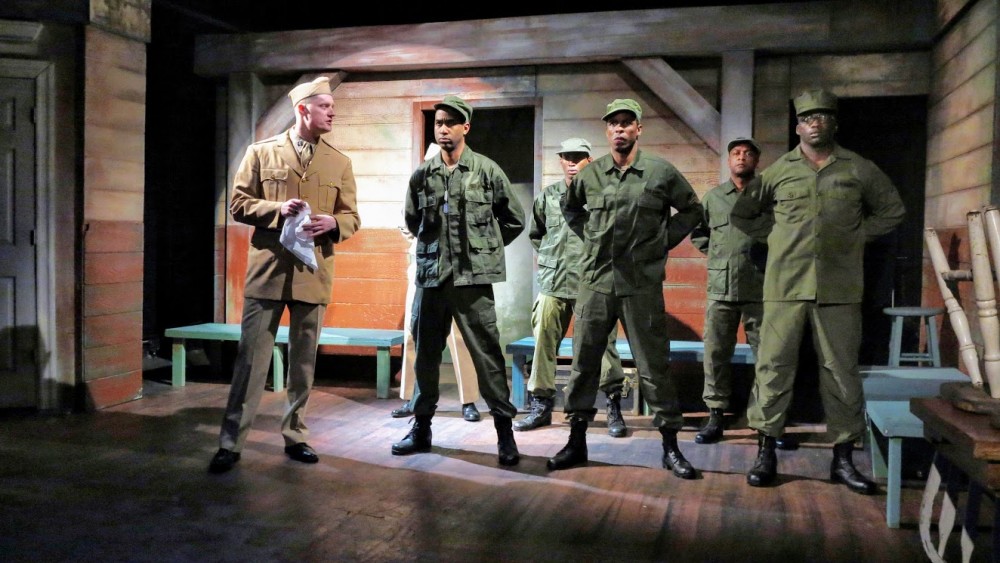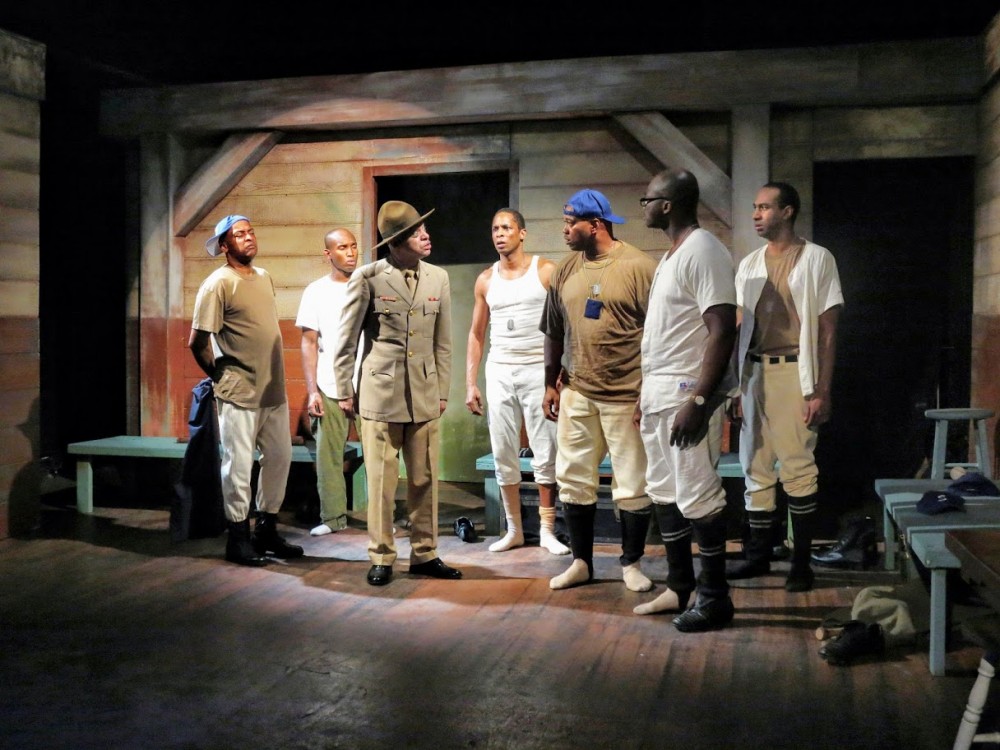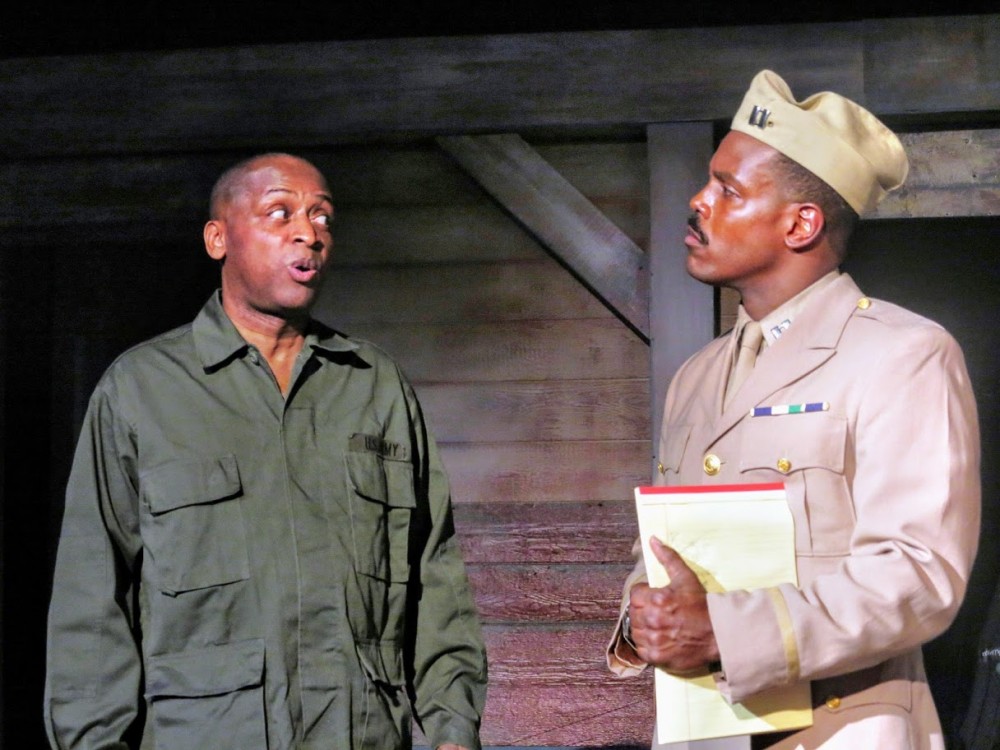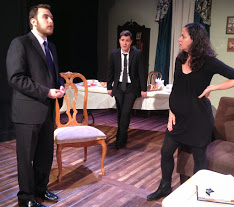by Carol Rocamora
The noble revival of A Soldier’s Play now running at the Gene Frankel Theatre resonates powerfully on several levels.
It brings back to pulsating life the celebrated Pulitzer-prize winning drama by Charles Fuller that launched the careers of some of our finest African-American actors – including Denzel Washington, Samuel L. Jackson, and Adolph Caesar. (The 1984 movie version was nominated for three Academy Awards.) Moreover, the play is being produced by the company that premiered it almost 40 years ago – the Negro Ensemble Company – reminding us of NEC’s lasting contribution to the American theatre. Above all, it sheds light on the tragic consequences of racism in a vital chapter of American history.
Set in 1943 on a segregated army base in Louisiana, A Soldier’s Play is essentially a gripping mystery story. Waters, a black Sergeant (Gil Tucker), has been murdered, and, to the surprise of everyone on the base, a black Captain named Davenport (Chaz Reuben) is sent to investigate. He is greeted with a range of reactions – mistrust by his counterpart, the white Captain Taylor (Buck Hinkle), disdain by other white officers, and enthusiasm by the black soldiers, who are hoping that the local KKK will be blamed for the crime.
The plot consists of a series of interviews that Davenport conducts with white and black soldiers alike, punctuated by flashbacks on scenes leading up to the crime. Davenport soon learns that Sergeant Waters was a tyrant who brutalized a majority of the black soldiers, particularly those from the rural south, whom he considers to be an embarrassment and an easy target for white hatred. The young black soldiers, in turn, don’t understand Waters’ enmity, since they are an up-beat, eager group who have gained admiration among the whites on the base for being a winning baseball team – indeed, there is talk that they might even have the chance to play the Yankees in an exhibition game.
Yet, despite their popularity, the black Sergeant Waters holds these young black men in contempt, belittling and ridiculing them whenever he can and exacting harsh punishments. The target of his cruelty is C.J. Memphis (Jimmy Gary, Jr.), a good-hearted, guitar-playing soldier, whom he holds in special contempt for his easy-going, affable nature, lavishing insults on him such as “clown-like, cotton-picking,” and other offensive epithets. “The black race can’t afford you any more,” says the cruel Waters, as he seizes the opportunity to place C.J. in solitary confinement. “One less fool for the race to be ashamed of,” Waters adds. C.J.’s confinement is the catalyst for the murder of Waters in the play’s powerful climax, and the ultimate solving of the crime.
Judging by the gasps in the audience, Waters’s brutal treatment of men of his own race is even more shocking than the scene in which a bigoted white officer (Lieutenant Byrd, played by Derek Dean) repeatedly calls Captain Davenport a “n—–” to his face.
Director Charles Weldon has assembled a dedicated cast of twelve to deliver Fuller’s story, and they shine as an ensemble. Gil Tucker gives a powerful performance as the complex Waters whose cruelty is born from his own experience in a racist society. “They’ll still hate you,” he cries, moments before his death, expressing his own feelings of rage. Chaz Reuben offers a clear portrait of Davenport, an ambitious black officer who is determined to be successful. Jimmy Gary, Jr. is especially touching as the soft-hearted C.J. Memphis.
Like Athol Fugard in South Africa, Charles Fuller writes about racism and man’s capacity for cruelty and hatred. Fuller is asking us – blacks and whites alike – to look at ourselves long and hard in our own culture, and to question from whence this terrible capacity comes. Meanwhile, A Soldier’s Play will remain in the repertoire of the NEC and other theaters until we find the answers.
A Soldier’s Play by Charles Fuller, directed by Charles Weldon, produced by the Negro Ensemble Company, at the Gene Frankel Theatre, 24 Bond Street, New York, through March 4.

























